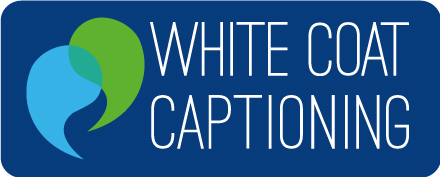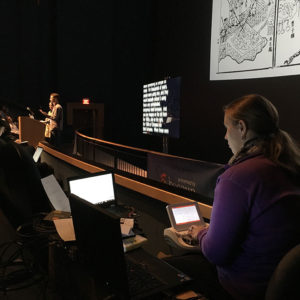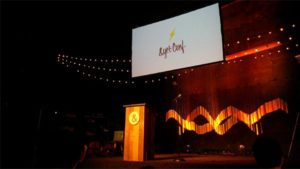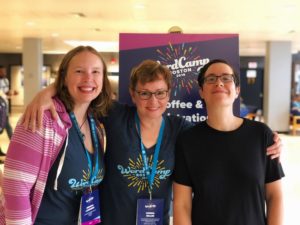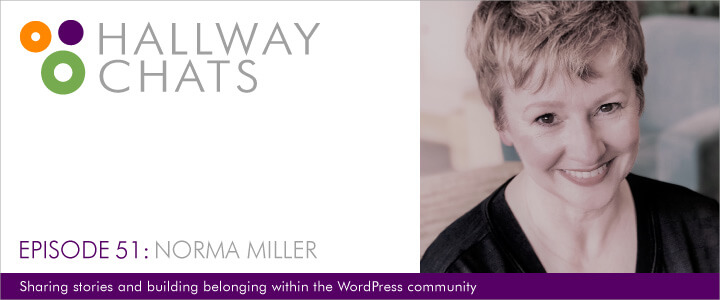
Introducing Norma Miller
Norma Miller is an international captioner and as such is the owner of the captioning firm White Coat Captioning. Through her company, Norma and her team caption live conferences, seminars, classes, events, and more around the world including more WordCamps than we can count. Norma calls Vermont her home where she lives with her husband and her Yorkie, Mr. Jefferies.
Show Notes
Website | White Coat Captioning
Website | White Coat Captioning UK
Twitter | @whitecoatcapxg
Episode Transcript
Liam: This is Hallway Chats, where we talk with some of the unique people in and around WordPress.
Tara: Together, we meet and chat with folks you may not know about in our community.
Liam: With our guests, we’ll explore stories of living – and of making a living with WordPress.
Tara: And now the conversation begins. This is Episode 51.
Liam: Welcome to Hallway Chats. I’m Liam Dempsey.
Tara: And I’m Tara Claeys. Today, we’re joined by Norma Miller. Norma is an international captioner and as such is the owner of the captioning firm White Coat Captioning. Through her company, Norma and her team caption live conferences, seminars, classes, events, and more around the world including more WordCamps than we can count. Norma calls Vermont her home where she lives with her husband and her Yorkie, Mr. Jefferies. Welcome, Norma. Glad to have you here.
Norma: Thank you. I’m glad to be here.
Liam: Hi, Norma. Thanks for joining us today.
Norma: Hi, Liam.
Liam: Good to see you and to hear you. Tell us a little bit more about yourself, if you would, please?
Norma: Well, I’m a native Vermonter, if I can claim that because I guess, you have to be something like six generations or something in order for anyone to think you’re really native in Vermont. I’ve lived here all my life, with the exception of a couple of years when I lived in London, which is really strange because I come from a town of around 200 people, originally where I was born, and the next place I lived was the major metropolis of London. I started my career as a court reporter way back, probably before many of the listeners were born. My career has evolved over the years to now being a captioning firm owner.
Tara: How did you make the transition from court reporter to captioning? Are they similar in terms of the technology that they use?
Norma: Yeah, the basic skill is the same and yes, my career evolved– in the early ’90s, the BBC in London was recruiting for Americans to come to London to become captioners. They did this big recruitment process thing and I applied sort of on a lark. And, oh my goodness, I got the job. They sent me to the National Captioning Institute in Washington DC to be retrained because when you’re a court reporter, or at least in those days when you were a court reporter, you were just writing things down and you would transcribe them later. So you could make the changes or edits or things that you got wrong later at your own pace. When you’re a captioner, everything has to come out readable and clear on the first try. Things like homonyms used to be written all the same and then you would later transcribe you’re, your, yore, you are. You would know in the context what would be the right way to transcribe it. When you’re writing for real-time or captioning, you have to write those on a stenography machine in a different way so the computer can translate it correctly. Because, as we know, computers are very literal. That’s one of the challenges of transitioning.
Liam: How long did that training take in terms of the length of the class? But then, I guess, also how long did it take for your brain to say, “Oh, this is how we do it now.”?
Norma: I look back on this and I think, “Really? This happened? I can’t believe it.” It was a two-week boot camp where they essentially eviscerated my entire stenography dictionary and my theory. They made me change so many things, it was unbelievable. And I was up for the challenge, I thought. They put me on a plane immediately from there to London, I landed in London, and on the first day, I literally started crying. I’m sure it was a combination of jetlag, culture shock, a million things. But I started crying and saying, “This was a huge mistake. Send me home.” And at the time, as well, I was a young mom, and my daughter was eight. She was back home with my husband and it was quite a challenge. The first day, I started crying and they were just having me practice, practice, practice on site at the BBC. I was also, of course, getting used to the accents, and the spellings, and the terminology.
Liam: And the phraseology, and the idioms.
Norma: Yeah, phraseology. Boy, I got caught on a couple of interesting bloopers there. Six weeks later, I was on the air captioning Wimbledon.
Tara: Wow.
Liam: You learn quick then, I guess?
Norma: Yeah, it was not without a considerable amount of stress but it was definitely awesome. I mean, it was one of those things where the adrenaline just starts to rush and I went, “Oh, my god. This is want to do for the rest of my life, this is so great.”
Tara: What do you love the most about it? I assume since you started in sort of a keyboarding, note-taking career with your court reporting, that you’re drawn to something about that, but I would think that captioning would also have– I’m imagining this, so I could be completely putting this upon you, but there’s definitely a service aspect to it, in that you’re providing something so valuable to people. Talk a little bit about what you love about what you do, what’s drawn you to it and kept you there? Because I can tell you’re so enthusiastic about it, and I love that.
Norma: I do, I get a little bit excited when I start talking about it which is really, really great. At this stage in my career and my age, etc, I feel like it’s rejuvenated my career and rejuvenated really my entire life and all aspects of it. Yeah, I’ve always loved my career. I loved it when I was a court reporter but I think iteration is, for me, so much more exciting and it fits my personality more. When you’re in court or deposition, you’re meant to be a part of the woodwork, relatively invisible, you’re just doing a job. I always thought like I was appreciated but not in the same way. Now, it’s like, I feel like a concert pianist or an Olympic athlete off and on the job these days. We get so much positive feedback and we do feel like we’re just appreciated in a different way, and our personalities are allowed to come through as well. I don’t know, it ticks all the boxes in terms of work satisfaction for me. It’s super challenging, it’s unique. It’s like the coolest job, I think, that people don’t know exists, kind of thing. Then when they see it, they’re in awe. It just makes me and the people on my team– it’s like, “Wow, we’re feeding each other.”
Liam: Yeah, I almost wondered when Tara was phrasing the question about why you like it if maybe a good analogy might kind of be the difference between court reporting and what you’re doing now, live captioning, is kind of the difference between the amateurs and the pros. It’s all real time, you can’t change it later that night and say, “Well, the lawyers haven’t seen it yet so I can fix it up. That’s not what they said, so I can swap this word, I remember because that’s in my brain.” It’s, you’re right or you’re not. It’s just live and there’s no, “Stop the clock. The ball went out of bounds.” Everybody is reading it, whether it’s 100 people in the room or 10,000 people.
Norma: That’s exactly right, and they’re reading it in real time. Of course, when we do make bloopers, they’re always the worst blooper you can imagine. [laughter] It’s higher risk, I would say. I would say that professional court reporters are amazing and they, too, are– I wouldn’t call them amateurs.
Liam: No, I didn’t mean it in a professional way. Just kind of the difference of pressure, stress.
Norma: Yeah, I say that– and this may sound to my colleagues extremely self-serving, but I think we are sort of at the tippy-top highest echelon of performers, really. I really do keep likening it to being a performer.
Tara: And you’re also now, not only are you doing this as a career, but you are also running a business. That takes things to a whole another level as well, because when you are running the business, you’re running the business more than you’re doing work sometimes. So talk a little bit about your team and also how you got connected with WordCamps and, I imagine, all the travel that’s involved in that. I’m asking you a lot of questions at once.
Norma: Okay. [laughs] I’ll try. Yeah, let’s see, running the business, that’s whole new thing for me. Even my husband sort of asks often, “How do you know how to do this?” I’m basically asking myself that same question every single day as well and suffer a little bit from imposter syndrome in that realm, and I don’t know. Team members of mine have spoken to other people who are members of our community that we serve, and they say things like, “Norma had a vision. That’s why she’s different.” And I go, “I’m not so sure.”
Liam: Sorry, I was reminding you that we’re recording this so if you want people to think you had a vision, they won’t anymore.
Norma: I know and it’s fine. I admit that freely from this state. I feel like I was just out in the ocean, and a big giant wave went by and I saw a surfboard there. And for whatever reason, I grabbed it and got on and here I am.
Tara: Was one of those surfboards WordCamp? How did you get connected with it?
Norma: I think one of those surfboards definitely was WordCamp. I got connected– should I say names?
Tara: I guess, yes.
Norma: Yeah. Kevin Cristiano, who’s one of the big organizers and members of the community. I’ve got a call from him at one point and he had the need. I’m not sure, they’d had somebody come in to do a small portion the year before, one of my team members, Mirabai. Then the next year, they wanted to do all the tracks. Mirabai is only one person, so maybe I was recommended because she’s my strategic partner in New York. And somehow or another, that was the beginning. We worked together, and it was a challenging thing. It was a big challenging setup and everything. We pulled it off and we pulled it off well. That was the beginning, really, of how I got involved in WordCamps.
Tara: Yeah, it’s definitely a focus of the internet is to be accessible, and as WordCamps are part of that community, I’ve seen more and more WordCamps having captioning. I think I may have been at that WordCamp New York, the first time that they captioned all of the sessions. I remember that transition and how exciting the vibe was there about it, everybody was really involved. So what portion or what percentage of your business is WordCamps? What other types of things do you cover?
Norma: I’m not sure if I could put a percentage under the heat of the moment here, but percentage of tech, let’s just say that the reason that my company was called White Coat Captioning, originally, the plan was to specialize in medical captioning, because I had been through medical school, captioning for a medical student several times at that point, and that’s what we decided. We decided, “That’s what we’re going to do, we’re going to specialize. Full stop, specialize. But also specialize in medical.” A very difficult jargon that many other captioners just don’t have any interest in doing or they’re not capable of doing. Back to the idea of whether I had a vision or not, that is true, I did have that vision of wanting to specialize in something really difficult that no one else dared to touch, that kind of thing. That’s where the name White Coat Captioning came from. Then the tech community discovered us. In many ways, I think the tech has eclipsed the medical. We’re still going full-on on the medical, and we have a staff that is really specialized in doing that on a day-to-day basis. But I grabbed on to the tech and I’m doing the travel that’s involved and that sort of thing.
Tara: So you’re doing that yourself?
Norma: Exclusively what I’m doing now is running the business and doing travel tech conferences. We do many, also, remotely, but when it requires travel, I’m the first one on the list to go.
Tara: and you have a team of how many people?
Norma: I have a team that I can draw on of about– a core team that’s really working, I would say, pretty close to full time, of 12. I actually have many more than that that I draw on, on an ad hoc basis.
Tara: I have a funny story about captioning. Actually, it was at WordCamp Philly and it was Halloween. So some people were dressed up in costumes and there was a young man captioning a session and he was wearing a boy scout uniform, and I thought, “How cool that there’s a boy scout who’s doing a service project and captioning for WordCamp?” And then I saw him at another WordCamp after that and I was like, “Oh, he’s not a boy scout.” [laughter]
Norma: Oh, I have the background story for that. That’s so great, I love that story.
Liam: Before you go, I should just say that I didn’t have a dissimilar thought. I saw the captioner in a– I’m like, “Oh, there’s a boy scout here. Wow, that’s great.”
Norma: Oh, I love that. Oh, my gosh. I’m so glad you told me that story.
Liam: And then I realized, “Oh, it’s the captioner. Why is he dressed as a boy scout? Oh, it’s Halloween. We told people to come in costumes. Alright, I’m with it now. I’m all good.”
Norma: Yes, Liam was the organizer of that conference, that WordCamp. I intended to go, but I had to be somewhere else. I was in Europe somewhere. So I put together my team which consists of Stan, who often is one of my first choices to do WordCamps. Mirabai, who’s one of our first choices, and Amanda, who’s also one of our first choices. All my people are my first choice. And that is one thing that distinguishes my firm from other captioning firms is that I only hire the cream of the crop and they have to earn their places there. But I saw that it was a Halloween theme for that WordCamp and I was kind of chiding them a little bit, or encouraging them, “Come on, guys, are you going to–” Even on Twitter, I semi-publicly said, “I wonder if my captioners are going to be wearing costumes.” And Stanley joked and he said, “Lol, I will see what I can do.” And didn’t tell me anything more. Then they sent a photo of the three of them and I went, “Yes!” And his boy scout uniform, he was intended to be the little boy in Up!. Yeah.
Liam: That’s awesome.
Norma: I was really thrilled that they pulled out all the stops for that.
Liam: Yeah, that was a lot of fun. Norma, I want to ask you one of our signature questions if I can. You talked about your career and your life, and the vision and the happiness that you’re finding through career. Not just in business success but really the joy of what you do and how you do it and the way that you get to do it. With that in mind, I wonder if you can share with us what your definition of success is? It could be personal success, it could be professional, maybe combination of both, maybe you have separate definitions. Can you share those with us?
Norma: Yes, absolutely. I think my definition of success is multi-part. I think I mentioned it earlier, I alluded to it, anyway. I feel like the boxes that I could tick are, are you happy in what you’re doing, are you good at it, do you feel challenged, are you doing good for somebody or for a community, and are you well-respected and appreciated and compensated. That has to be one of the pieces as well. I check yes to all of those in my business and personal life. It feels like, wow, I feel like I won the lottery in so many ways. It’s very meaningful to me because– I’ll just say this very quickly and then move on, but I had not the most advantaged childhood, let’s say that. I find this interesting, it’s quite a theme in many of the best captioners. When we sit around and talk, it seems like we’ve had some challenges in our earlier lives and somehow or another, this career drew us to it maybe for that reason. I think one of the number one things you have to have when you’re a captioner, a really good captioner is you have to be able to focus 100%. Basically, the world around you can fall down and you have to just focus on the words and getting the words. I think that maybe having had past challenges in one’s life really contributes to that ability.
Tara: Thank you for sharing that and that insight, I think, is really interesting to be able to have that focus. It’s a hard thing to do.
Norma: Yes, it’s interesting. I sometimes work in doing not-tech work, something like, for example, in the vocational rehab department. I do captioning for them as well. The counselors will come up to me and say things like, “This looks like a really great career. And people can do it from home.” And they assume that the number one thing you need to do is just be a fast typist, and I just go, “No, the number one thing you need is to be able to focus 100% at all times for long periods of time.”
Tara: Yeah, that would be very hard for me, I’m sure, and for many people. It’s a gift that you have, for sure. You’re traveling a lot, you’re running a business, you’re doing something you love and you live in what sounds like a pretty idyllic place in Vermont. Talk a little bit about how you manage all of this and what you do for your mental health, how you manage the stress of running a business and riding a surfboard and all those things? [laughter] What do you like to do for fun?
Norma: I love to workout, I do it as often as I can, and it’s a challenge keeping that up when I’m timezone-challenged. The timezone thing is hard and it does take its toll. But I love to do– maybe it’s analogous to what I do for work as well, I love sprinting. I do the high-intensity interval training type of workouts and I can do three sets of 12 pushups, [laughs] that sort of stuff. There’s that. I think that’s actually essential, we need to keep fit in order– because, really, what we’re doing is almost like an athletic event when we’re working every day. A huge thing that has been a lifesaver for me is I got an assistant, I employed an assistant. She does an awful lot of the admin stuff that I used to do all of, in addition to all the captioning. I’ve limited what I caption, what I do now. Now I do only tech conferences or other types of conferences as well but really mostly just tech. The day-to-day things like classes and meetings and such, I delegate that to others. I get massages, I treat myself really well. When I’m in the airport, I’m in the spa if there’s time, that sort of stuff. You just need to. The sleeping thing is a challenge, and I have clients from Australia to California, so I’m kind of almost always on. I have to just manage that. I turn off the phone, I listen to podcasts, and walk many miles and run, I sprint in-between the walking and that sort of stuff. That’s just the way I manage it all. And I have really great support. As I say, I do not hire someone that’s going to give me stress, that I’m worried that they’re not going to perform well or that I’m going to get any negative feedback from the client, that sort of thing.
Tara: What’s the pool of captioners that are out there? How do people find this career? How do you find people who do it?
Norma: It’s so small. Thank goodness for social media because, really, I found all of my people via social media. And I don’t know how I would have done it in the old days before that. Because finding the right people is really difficult. I mean, on the global scale– I know there are a few more diamonds out there that I haven’t found. But on the global scale, I’ve almost maxed it out. Or the additional ones that are diamonds are already so busy that they can’t join my team.
Tara: Wow, that’s really small then.
Norma: It’s super small, yeah.
Tara: Are young people coming into it?
Norma: We’re trying so hard to change the demographic. What has happened in our field is that our field is court reporters — and that’s our accreditation body is also in the court reporting field. Then there’s this little outcropping of captioners, and so, court reporting as a profession had some challenges when things like voice recording and such came along. The career seemed to be dying, so a lot of the schools closed. We basically lost a generation. Many people in the field are my age. Me, I’m my age, going on 27. [laughs] I like to think of myself– most people my age are thinking about retiring and they’re done, this is the end of their career. And I don’t deem them to be the right demographic for my company. We are trying really hard. We decided we– I don’t know who I’m referring to in the we, the royal we, I guess, but also the top group of captioners, together we were talking about who to recruit from. Now that is changing. For so long, it was considered sort of a clerical career, so the wrong sorts of people were going after it. There’s about a 95% dropout rate in the schooling, and it always has been, since the ’40s. Now, it suddenly dawned on us, big lightbulb went off, “You know what? We’re going after the wrong people.” And the wrong people are going after this career. Now, we are doing talks and things like that trying to interest people like gamers, coders, people who this would really be– musicians.
Liam: Like the person who spends the summer learning to play guitar.
Norma: Exactly that. It’s exactly the same sort of aptitude. I’ve always said way back when I learned it, way back, I always used to say it’s really an aptitude thing. I think you can either do it or you can’t.
Liam: Sure. We only have about two and a half minutes left so I want to ask you another one of our big questions here. What is the single most valuable piece of advice, be it personal, professional, or otherwise that you have received and implemented in your life? Single most or one of the most important pieces of advice that you’ve incorporated into your life that’s really made a difference for you?
Norma: I think it’s just exactly, love what you do.
Liam: Nice and simple.
Norma: Yeah. And I think those other things have to come into it, all the other things that I mentioned earlier. But seriously, the number one thing is you’ve got to just be happy. You just can’t be miserable. [laughs]
Liam: Can I ask you, is that something that was imparted to you as a child or as an adult? You mentioned that perhaps your childhood had some challenges, that maybe it was later in life when–
Norma: Yeah, I feel like it was later in life kind of a lightbulb moment for me. I’m not really sure that I can put a finger on when that happened but definitely, I would say, later in life. Even after I was a mom, that sort of thing. Suddenly I went– because I feel like until that point, I might have just been treading water.
Liam: Sure. So your definition of success ties in very nicely with the advice that you were given and shared with us. Let me ask you this with just a little bit of time left. What’s the single most important thing you can do or should do or want yourself to do every day to maintain that success, to maintain that habit, or if you kind of lost it, to get it back?
Norma: My thing, and I keep talking to my colleagues about this as well who fret about various things, I just say, “Look, you just put blinders on and you run your own race. Just forget about people upset with you or competitors or whatever the thing is, just run your own race.” I think that has worked for me. I’ve flown under the radar in terms of my own career and found my own success.
Tara: I love that advice. I’ll take that to heart. Thanks for sharing that.
Norma: You’re welcome.
Tara: Well, Norma. I can probably keep asking you questions for a while more but we are out of time for today. Thank you so much for joining us, it’s been great having you. And thanks for what you do for the WordPress community and others.
Norma: You’re very welcome, and thank you for having me. I hope I didn’t ramble too much.
Liam: Not at all, it’s been an absolute pleasure having you on the show. Before we say goodbye, two things. One, I want to reiterate the thanks that Tara just shared, not just for being on our show but perhaps even more important, for the work that you and your team are doing for the WordPress and other tech communities to ensure that all sorts of people can get value out of tech conferences. Not just that but also the work you’re doing around letting people know that it’s not just those who may be hard of hearing that benefit from captioning, the whole range. Thank you for that. But before we do say goodbye, please let us know and let our listeners know where they can find you, please?
Norma: Oh, yes. You can find me on Twitter at @whitecoatcapxg, spelled a little bit strangely. And my website is Whitecoatcaptioning.com and also Whitecoatcaptioning.uk.co I think. It’s the UK version of it.
Liam: .co.uk then.
Norma: Yes. [laughs] Yeah, that’s where you can find me. I’m sort of semi on Instagram as well under the same handle but I’m not very active on Instagram. Find me there anyway and ask to join me or ask me to join you.
Liam: Excellent, thank you so much. Lovely to chat with you.
Tara: Thanks, Norma.
Norma: You’re very welcome. And thank you so much. I’ll see you at the next WordCamp.
Tara: Sounds great. Bye-bye.
Norma: Bye.
Tara: If you like what we’re doing here – meeting new people in our WordPress community – we invite you to tell others about it. We’re on iTunes and at hallwaychats.com.
Liam: Better yet, ask your WordPress friends and colleagues to join us on the show. Encourage them to complete the “Be on the show” form on our site, to tell us about themselves.
Tara: If you like what we’re doing here – meeting new people in our WordPress community – we invite you to tell others about it. We’re on iTunes and at hallwaychats.com.
Liam: Better yet, ask your WordPress friends and colleagues to join us on the show. Encourage them to complete the “Be on the show” form on our site, to tell us about themselves.
